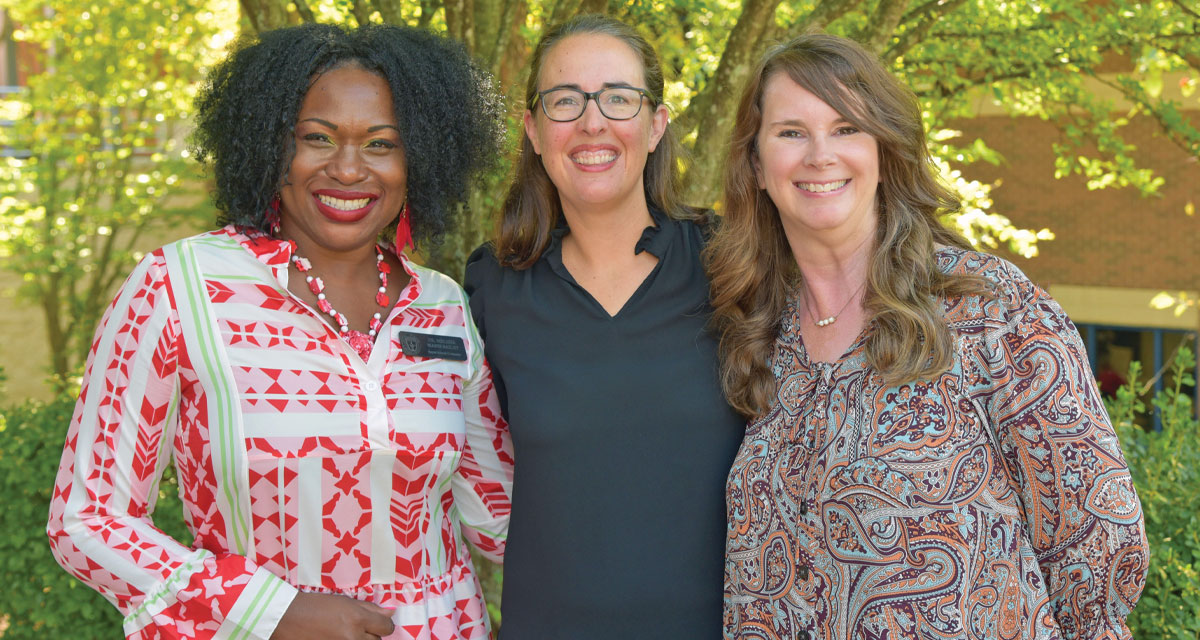By Priscilla St. John
Three women gather in a welcoming office overlooking the pond on Forsyth Country Day Schools’ campus. They are the school’s dedicated counselors who together serve the needs of students from age 2 through grade 12. They’re also moms. Meet Upper School Counselor Dr. Melissa Mann-Bailey, Middle School Counselor Mrs. Jenifer Gornik, and Lower School Counselor Mrs. Megan Martin-Wall. Pour yourself a cup of coffee or tea and settle in for a chat.
“Building relationships with kids comes down to two things: connection and communication,” Mrs. Martin-Wall says. Here’s how to do both more effectively.
Knock Down the Barriers
“When you’re talking to your children, never stand over them. Be considerate of their physical space,” Dr. Mann-Bailey says. If you’re behind a desk or counter, move so that you are next to them. “Let there be no physical barriers. Talk to them eye to eye, heart to heart, soul to soul. It’s authentic and it lets you meet them where they are.”
Ditch the Distractions
We’re always telling our kids to put down their phones or to turn off the Xbox, but we need to practice what we preach. “Put your phone down. Turn the TV off. Be present. Don’t even do other business, like folding laundry,” Dr. Mann-Bailey says.
Mrs. Gornik agrees. “If you’re in the middle of something and your child needs to talk, say, ‘I care about what you have to say and want to be able to listen fully to what’s on your mind. Just give me a moment to finish this and I’m all yours’.”
“If you’re in the car, turn the radio off and be fully present,” Mrs. Martin-Wall says.
Make the Time
We live in a world of perpetual busyness, and we need to make the time to build our relationships with our loved ones. Mrs. Martin-Wall advocates stealing a little time. “Skip the carpool every now and then in order to be alone with your child,” she says. “A little one-on-one time does wonders.”
“Figure out creative ways to build relationships with your children,” Dr. Mann-Bailey says. “Hone in on who they are. If they like cooking, cook together and talk together. Take them for a walk. It’s another way to let them see you in a different light.”
Be Vulnerable
For older elementary-school students on up, don’t feel the need to be “perfect” in front of them or to maintain the facade that you have it all together – especially during a pandemic. “As parents, we need to be able to identify our own emotions,” Dr. Mann-Bailey says. “Children can pick up on those emotions, so give yourself some grace.”
Mrs. Gornik agrees. “We want kids to share, so we can be an example of that. Model what you want them to do, which is communicate openly with you and other adults in their lives. We all make mistakes; they are opportunities for learning and growth.”
Provide a Safe Space
In order to get your children to connect and communicate, you have to give them a safe space to do so.
“Just listen,” Mrs. Martin-Wall says. “Don’t minimize or dismiss what they’re saying with something like: ‘You’ll be fine. Don’t worry about it.’ It minimizes what they are feeling. Just reflect on what you’re hearing. You can then say, ‘I’m sorry that happened. How can I help you?’”
“Let them know it’s OK not to be OK,” Mrs. Gornik says. “We don’t have to fix it. We don’t have to make them happy in that moment or give them all that they want. It’s OK to feel uncomfortable.”
Dr. Mann-Bailey wants you to pay close attention to what your child yearns for. “Listen to what their aspirations are and lean into that more,” she says. “It’s so beneficial.”
In order to keep the space safe and build trust between you and your child, respect your child’s privacy. “Keep things confidential,” Dr. Mann-Bailey says. “Don’t tell the whole family what your child told you. They trusted you. Get their permission if you want to tell anyone else.”
Build Your Network
Part of helping your child grow up in a healthy way means building a team of caring adults who can offer help and support if needed – especially during a stressful time like the pandemic. Your pediatrician, school counselors, teachers, and coaches are great examples of this. “You can help kids communicate their feelings and find their voices to talk to the adults in their lives who care,” Dr. Mann-Bailey says. “Parents and schools and coaches can be the bridge. Notice what’s going on with your kids, pay attention, and be there for them.”
At Forsyth Country Day School, partnering with parents to build better relationships makes our community stronger. If your child would benefit from an educational experience that values meaningful connections and meeting children where they are, please visit FCDS.org to learn more or call Nathan Battle at 336.946.1633 to schedule your tour today.






















